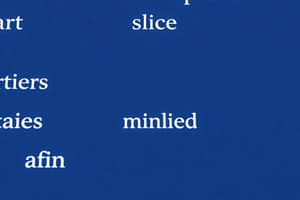Podcast
Questions and Answers
What is the primary purpose of subject-verb agreement in a sentence?
What is the primary purpose of subject-verb agreement in a sentence?
- To enhance the overall complexity of the sentence structure
- To maintain consistency in verb tense throughout the sentence
- To ensure clarity in the relationship between the subject and the verb (correct)
- To ensure the sentence has a specific length
Which of the following is an example of a misplaced modifier?
Which of the following is an example of a misplaced modifier?
- Running swiftly, the book fell from the table. (correct)
- The cat that was eating quickly ran away.
- He nearly completed the assignment on time.
- She only drinks coffee in the morning.
What effect does proper punctuation have on communication?
What effect does proper punctuation have on communication?
- It should be used sparingly to enhance elegance
- It adds unnecessary complexity to sentences
- It clarifies meaning and organizes ideas within sentences (correct)
- It primarily serves to emphasize certain words
Which of the following errors is an example of a run-on sentence?
Which of the following errors is an example of a run-on sentence?
When should formal language be used compared to informal language?
When should formal language be used compared to informal language?
What is the primary focus of morphology in grammar?
What is the primary focus of morphology in grammar?
Which of the following describes a simple sentence?
Which of the following describes a simple sentence?
Which part of speech is primarily used to connect words, phrases, or clauses?
Which part of speech is primarily used to connect words, phrases, or clauses?
What does the perfect tense indicate in a sentence?
What does the perfect tense indicate in a sentence?
In which sentence type do you find at least one independent clause and one dependent clause?
In which sentence type do you find at least one independent clause and one dependent clause?
Which of the following correctly identifies the present tense?
Which of the following correctly identifies the present tense?
Which of the following is not a part of speech?
Which of the following is not a part of speech?
What is the correct order of elements in English sentence structure?
What is the correct order of elements in English sentence structure?
Flashcards
Morphology
Morphology
The study of how words are formed, including prefixes, suffixes, and roots.
Syntax
Syntax
The study of sentence structure and how words are arranged to create meaningful sentences.
Semantics
Semantics
The study of meaning in language, including word meanings and how they relate to each other.
Phonology
Phonology
Signup and view all the flashcards
Subject-Verb-Object (SVO)
Subject-Verb-Object (SVO)
Signup and view all the flashcards
Simple Sentence
Simple Sentence
Signup and view all the flashcards
Compound Sentence
Compound Sentence
Signup and view all the flashcards
Complex Sentence
Complex Sentence
Signup and view all the flashcards
Subject-verb agreement
Subject-verb agreement
Signup and view all the flashcards
Pronoun-antecedent agreement
Pronoun-antecedent agreement
Signup and view all the flashcards
Misplaced modifiers
Misplaced modifiers
Signup and view all the flashcards
Run-on sentence
Run-on sentence
Signup and view all the flashcards
Formal vs. Informal English
Formal vs. Informal English
Signup and view all the flashcards
Study Notes
- English grammar encompasses the rules governing the structure and use of the English language
Key Elements of Grammar
- Morphology: the study of words and how they are formed, including prefixes, suffixes, and roots
- Syntax: the study of sentence structure and how words are arranged to create meaningful sentences, including phrases, clauses, and sentence types
- Semantics: the study of meaning in language, including word meanings and how they relate to each other
- Phonology: the study of sound systems in language. Crucial for pronunciation and understanding the structure of words
Parts of Speech
- Nouns: naming words (person, place, thing, or idea)
- Pronouns: words that replace nouns (he, she, it, they)
- Verbs: action words (run, jump, think, be)
- Adjectives: describe nouns (red, big, happy)
- Adverbs: describe verbs, adjectives, or other adverbs (quickly, sadly, very)
- Prepositions: show relationships between words (on, in, under)
- Conjunctions: connect words, phrases, or clauses (and, but, because)
- Interjections: express emotion (oh, wow, ouch)
Sentence Structure
- English sentences typically follow Subject-Verb-Object (SVO) order
- Different sentence types exist, including simple, compound, and complex sentences
- These structures are crucial for conveying information clearly and precisely. Understanding structure determines sentence meaning
- Simple: one independent clause
- Compound: two or more independent clauses joined by a coordinating conjunction (and, but, or)
- Complex: one independent clause and one or more dependent clauses
Tense
- Tense in grammar indicates the time of the action or state.
- Present tense: describes actions happening now, habitual actions, or general truths
- Past tense: describes actions that have already happened
- Future tense: describes actions that will happen
- Perfect tense: indicates an action completed before another action
- Past perfect: an action completed before another past action
- Present perfect: an action completed before now or has continued until now
- Future perfect: an action to be completed before another future action
- Understanding verb tense is fundamental in conveying the correct timing/sequence of events
- Irregular verbs have unique conjugation patterns that need memorization
Agreement
- Grammatical agreement refers to the consistency between different parts of a sentence
- Subject-verb agreement: the verb must agree with the subject in number
- Pronoun-antecedent agreement: the pronoun must agree with the noun or pronoun it refers to
- Adjective-noun agreement: must agree in relation to number
Punctuation
- English grammar relies on punctuation to clarify meaning, separate ideas, and organize sentences
- Commas, periods, semicolons, question marks, exclamation points, colons
- Proper punctuation is crucial for clear communication, as without correct punctuation, the meaning of a sentence can be completely shifted
- Commas serve to indicate pauses or to set apart elements within a sentence
- Colons and semicolons indicate a pause stronger than a comma, but less than a period
- Commas are used to separate items, or to show where clauses exist
Common Grammar Errors
- Misplaced modifiers: a modifier not placed adjacent to the word it modifies
- Subject-verb disagreement: not using verb forms appropriate to the subject
- Run-on sentences: two or more independent clauses joined incorrectly
- Sentence fragments: incomplete sentences
- Pronoun case errors: incorrect use of personal pronouns
- Tense errors: not using correct tense forms
- Word choice errors: choosing inappropriate words
Styles of English
- Formal and informal styles dictate different levels of formality in word choice, grammatical structures, and vocabulary
- Context and situation impact appropriate language choices and structures
Key Concepts of English Grammar
- Key concepts of grammar and usage help writers craft clear, concise, and meaningful sentences and paragraphs, influencing how readers perceive intended meaning.
Studying That Suits You
Use AI to generate personalized quizzes and flashcards to suit your learning preferences.




